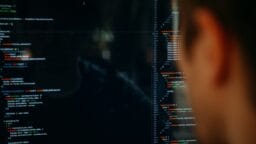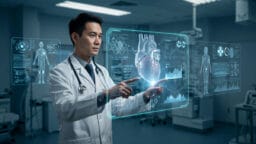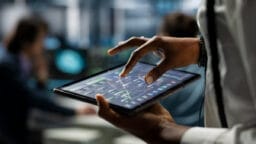Coronavirus, the dreaded COVID-19, is the biggest healthcare scare the world is grappling with. Medical researchers and scientists are using every ounce of their ingenuity as well as the latest technical innovations to fight the pandemic. We are now seeing how Artificial Intelligence (AI) and machine learning are playing key roles in healthcare to understand and control the pandemic.
AI is re-defining how medical treatments and the healthcare industry will work in the future. A medical assignment help provider shared that the use of AI in telemedicine has seen an unprecedented rise recently. The versatility and flexibility of AI complement telemedicine in four ways:
Patient Monitoring
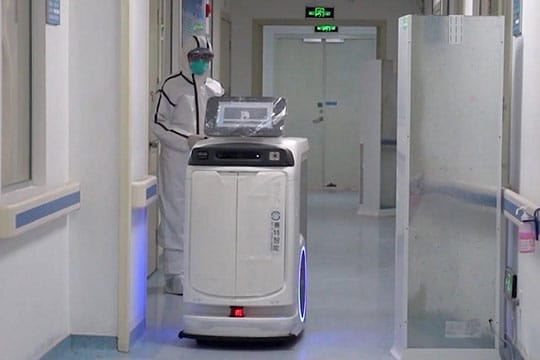
While video-conferencing allows face-to-face consultant with the doctor, smart digital medical devices, and wearables make it possible to record and transmit a patient’s clinical data to the doctor in real-time. This allows greater accessibility to healthcare services even in remote areas and is cost-effective, efficient, and easy to use.
Recently, we have seen remote-controlled telepresence robots moving around hospital hallways and rooms to reduce the contact between medical staff and patients. The use of AI, navigation systems, intuitive, vision systems, and micro-projects allows these robots to serve as an effective medium for patient-doctor communication.
Besides managing and monitoring patients, these AI-enabled robots can also predict the amount of medication a patient needs to be based on their previous data. Application of machine learning is developing self-diagnosing techniques that may soon make these robots capable of serving at-home patients too.
Recommended for you: Top 10 Healthcare Technology Innovations We Have Witnessed!
Healthcare Information Technology
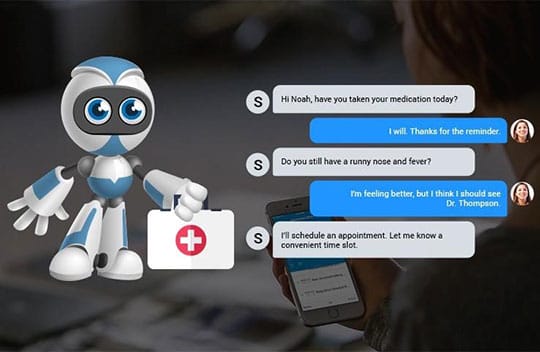
Rising numbers of COVID-19 suspects are rising every day presenting a new challenge to the healthcare institutions – how to screen people for the symptoms of corona infection and how to answer the public’s millions of questions buzzing on their websites. AI chatbots are easing off the strain on them by distributing accurate, verified information and doing a contactless screening of the suspects by asking them a few questions on their symptoms.
Big Data Analytics and Neural Networks are being used to handle the large scale of data on patients’ records. This includes data of patients registered in hospitals as well as the medical information collected through the self-diagnosing technologies. The use of artificial intelligence allows quick retrieval and analysis of data to help the doctors prescribing treatments to their patients. AI-enabled chat interfaces allow patients to quickly send their photos and videos to doctors who, in turn, can send prescriptions and other information to patients quickly.
AI software can also help with detecting disease at an early stage. The Houston Methodist Research Institute in Texas uses AI software that can assess mammograms 30 times faster and with 99% accuracy. The Internet of Medical Things (IoMT) is AI-integrated medical devices and consumer wearable that can help in tracking such diseases in earlier phases when it is easier to treat a patient.
Cloud computing allows efficient collection and distribution of the patients’ information, standardization of medical information and records, and telemedicine collaboration. If you are worried about the security and confidentiality of the patient’s information traveling over wireless connections at the global level, it may get resolved soon. In India, a study has proposed digital watermarking of medical images ensuring the confidentiality of the diagnosis.
Intelligence Assistance Diagnosis
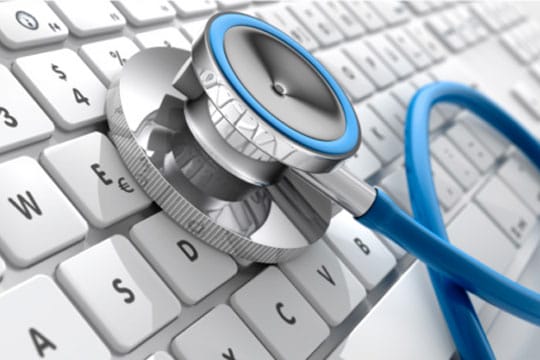
Machine learning and neural network programming make robots smarter every day. In the healthcare industry, machining learning AI is already being used to collect medical information, assist patients physically, and analyze their evaluation data. Soon, they will be capable of making an intelligent diagnosis.
In the telehealthcare systems, smartphone apps and various types of other software are already being used for self-diagnosis. These apps and devices quickly evaluate your symptoms, breathing rate, pulse, heart rate, etc. to predict the health condition of a patient. The AI models of screening and evaluating a patient through a questionnaire are being fine-tuned. They help doctors in offering more accurate consultations on the phone or online and making telehealth more effective.
Medical scientists are using AI-empowered computer models to find unexpected predictors of disease. These include studying demographic, laboratory, and radiological findings of Corona-positive patients to see the symptoms they develop. t is also used to track medical decisions and the outcomes they led to. A study of the data of 53 Corona-infected patients in two Chinese hospitals revealed that the levels of liver enzyme ALT (alanine aminotransferase) and hemoglobin and reporting of myalgia may predict the development of severe ARDS (Acute Respiratory Distress Syndrome) in Corona patients. Such tools are expected to become smarter when they are fed with more data in the future.
Wireless telemedicine applications also include providing data of the nearest ambulance available in an emergency or to prepare for an incoming patient to offer faster service when he or she arrives at the hospital.
You may like: 7 Occupations Irreplaceable by Artificial Intelligence (AI).
Information Analysis and Collaboration

Novel coronavirus outbreak saw how modern technology enables medical experts and researchers from different countries to collaborate while sharing medical data, information, and different medical perspectives. It has revolutionized the world of pharmaceutical research forever. Clinical test results are being consolidated using big data analytics and neural networks are being used to recognize patterns and analyze data. AI is being used to determine the efficacy of different pharmacy products and treatment outcomes.
Application of neural networks allows medical researchers to find connections in medical diagnoses and other records of patients from different hospitals and reveal new insights on healthcare practices and trends. It can help in developing better and more accurate predictive AI tools for the healthcare industry and to provide better care to patients at home.
AI-based predictive tools are being developed and used to foretell which patients are most vulnerable to the novel Coronavirus. When perfected, these tools can help physicians in making decisions like which patients need beds and which ones can be sent home safely. This is an incredibly useful application in a scenario when hospitals and healthcare resources are stretched thin.
Other ways in which AI is helping with Healthcare
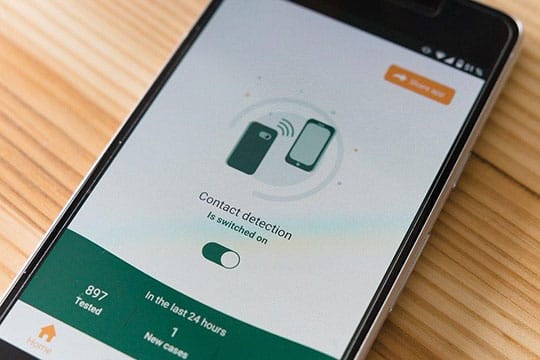
Studying the spread of infection:
 Artificial Intelligence also helps with understanding and tracking the spread of infectious diseases. A Canadian company called BlueDot had predicted the Coronavirus outbreak soon after its first case was reported in China on December 31, 2019, with the help of its innovative AI program. This program uses the knowledge of epidemiologists on how and where to look for evidence of emerging diseases. It also analyzes more than 100,000 reports a day in many different languages and sends out alerts to government, health care, public health clients, and business clients.
Artificial Intelligence also helps with understanding and tracking the spread of infectious diseases. A Canadian company called BlueDot had predicted the Coronavirus outbreak soon after its first case was reported in China on December 31, 2019, with the help of its innovative AI program. This program uses the knowledge of epidemiologists on how and where to look for evidence of emerging diseases. It also analyzes more than 100,000 reports a day in many different languages and sends out alerts to government, health care, public health clients, and business clients.
Contact tracing through apps:
 AI-based contract-tracing smartphone apps are also being used to track and flag possible carriers of the virus. China, Hong Kong, India, Italy, Israel, Singapore, and South Korea are popularly using these apps to detect the whereabouts of the users and to track who has come in contact with them. AI algorithms assess the risk of cross-infections and alert users. Donating data is said to be the second-most simple way to spread the viral infection (after washing hands).
AI-based contract-tracing smartphone apps are also being used to track and flag possible carriers of the virus. China, Hong Kong, India, Italy, Israel, Singapore, and South Korea are popularly using these apps to detect the whereabouts of the users and to track who has come in contact with them. AI algorithms assess the risk of cross-infections and alert users. Donating data is said to be the second-most simple way to spread the viral infection (after washing hands).
No-contact screening:
 AI-powered smart glasses and computer vision technologies are being used by the security personnel to detect people with fever in large clouds without contact. Other forms of testing are also using AI to speed up the process. AI programs combined with a chest X-ray scan can highlight lung problems and COVID-19 risk evaluation much faster than the traditional methods.
AI-powered smart glasses and computer vision technologies are being used by the security personnel to detect people with fever in large clouds without contact. Other forms of testing are also using AI to speed up the process. AI programs combined with a chest X-ray scan can highlight lung problems and COVID-19 risk evaluation much faster than the traditional methods.
No-contact assistance:
 Robots are being used for contactless delivery in hospitals and public spaces, doing the thermal screening, and dispensing hand sanitizer to visitors. Robot Dogs, such as Spot, are quite popular in the US hospitals for helping the health workers in assisting contagious patients without endangering themselves. Drones are being used to spray disinfectants in public areas.
Robots are being used for contactless delivery in hospitals and public spaces, doing the thermal screening, and dispensing hand sanitizer to visitors. Robot Dogs, such as Spot, are quite popular in the US hospitals for helping the health workers in assisting contagious patients without endangering themselves. Drones are being used to spray disinfectants in public areas.
Discovery and development of drugs and vaccines:
 AI is being used to process a vast amount of complex pathology data in a short time speeding up the process of diagnosis and treatment. Insilico Medicine used an AI system to identify thousands of molecules that may help in treating COVID19 in just four days! The company published its findings and researchers around the world can use them to contribute toward fighting the pandemic.
AI is being used to process a vast amount of complex pathology data in a short time speeding up the process of diagnosis and treatment. Insilico Medicine used an AI system to identify thousands of molecules that may help in treating COVID19 in just four days! The company published its findings and researchers around the world can use them to contribute toward fighting the pandemic.
Artificial intelligence is offering incredible assistance in increasing the speed, scalability, and accuracy of drug discovery and development processes. This is the reason we are hearing the news about novel COVID19 vaccines being designed and developed so fast these days.
Robotic-assisted surgery:
 Robots are assisting surgeons since 1985. They are being used in several medical specialties, such as orthopedic surgery, emergency care, neurosurgery, and laparoscopy. Artificial intelligence allows these robots to evaluate data from medical records and even physically use surgeon’s instruments with little or no human interference. These AI-assisted robots can use their past surgical experiences to develop new surgical techniques too.
Robots are assisting surgeons since 1985. They are being used in several medical specialties, such as orthopedic surgery, emergency care, neurosurgery, and laparoscopy. Artificial intelligence allows these robots to evaluate data from medical records and even physically use surgeon’s instruments with little or no human interference. These AI-assisted robots can use their past surgical experiences to develop new surgical techniques too.
Medical studies have found that AI-assisted robotic surgery saw a reduction of surgical complications by five times! In cases of orthopedic surgery, it reduced the time of hospital stay by 20%.
You may also like: Future of eCommerce Apps for Health, Fitness & Nutrition Industry.
Final Words
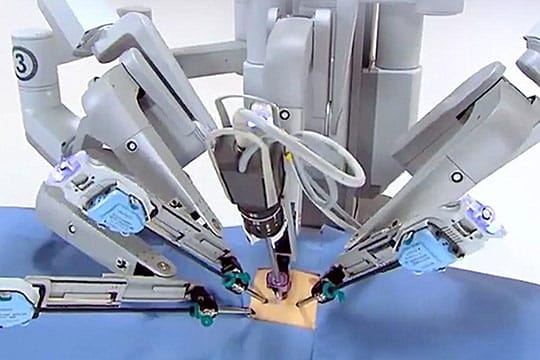
Biggies like Google has realized the way AI can revolutionize the healthcare industry. Google’s DeepMind Health partners with doctors, researchers, and patients to tackle everyday healthcare issues while transforming its dynamic learning algorithms to make the system smarter. IBM’s AI-empowered Watson for Health combs through massive amounts of global health data to determine the diagnosis and treatment options for a patient. We can see it all happening now.
This article is written by Jessica Jones. Jessica is an academic writer at GoDissertationHelp, a Company based in the UK which provides all kind of academic help to the students. She loves to write about technology, education, marketing, digital marketing, Life, etc. She is working in GoDissertationHelp, an academic writing service that provides the Marketing Dissertation, MBA Dissertation, and Nursing dissertation.

